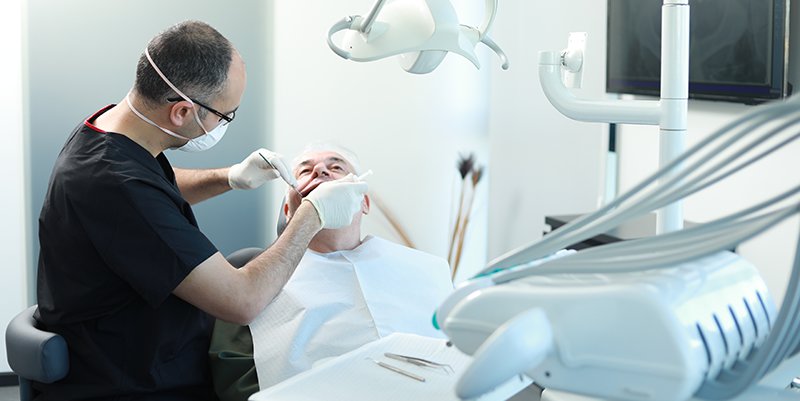ORAL, DENTAL AND MAXILLOFACIAL SURGERY
What is oral, dental and maxillofacial surgery? Ankara maxillofacial surgery
Ankara Oral, Dental and Maxillofacial Surgery is a medical field that performs the medical and surgical treatment of congenital and acquired diseases of soft and hard tissues of the mouth, jaw and face, and aesthetic, functional and phonetic problems caused by infectious, traumatic and all kinds of pathological causes.

Which diseases does oral, dental and maxillofacial surgery treat?
Many issues related to oral and dental health such as tooth extraction, embedded tooth operation, implant, jaw fracture treatment, jaw tumor, detection and treatment of abscess and cysts, and regulation of tissues before denture and orthodontic treatment are within the scope of jaw surgery.
The medical and aesthetic treatment of all kinds of hereditary or subsequent pathological problems in the jaw, mouth and face area are evaluated within the scope of oral dentistry and surgery.
In answer to the question “What does jaw surgery treat?”, most people turn to maxillofacial surgery for a variety of oral problems, from tooth wear and tear to jaw joint pain. Potential problems such as biting, chewing and swallowing food are a very common among maxillofacial surgery patients. Elimination of problems caused by the abnormal shape and size of the mouth opening, such as audible breathing, difficulty in speaking or snoring, is also within the scope of this department.
- Extraction of complicated teeth and teeth embedded in the palate,
- Surgical treatments of all kinds of infections of the mouth, jaw and face,
- Surgical treatments of formations such as cysts and tumors in the jaws,
- Surgical treatments of soft tissue diseases of the oral region,
- Treatment of dental origin intraosseous lesions (Apical Resection),
- Treatment of fractures in the jaw and face area,
- Surgical correction of soft and hard tissues before denture construction,
- Medical and surgical treatments of jaw and facial pain,
- Medical and surgical treatments of jaw joint diseases,
- Treatment of cleft lip and palate,
- Medical and surgical treatments of salivary gland diseases
- Correction of deformities that cause aesthetic and functional disorders in the mouth, jaw and face by surgical methods,
- Treatment of bone necrosis in the jaws due to drugs and radiotherapy applied within the scope of cancer treatment,
- Implant applications.
How are intraoral surgical procedures performed?
Oral surgery is performed in operating room conditions and in a sterile environment by specialists in this field. Intraoral surgical interventions, which are mostly performed under local anesthesia, that is, by numbing the relevant area by injection, can sometimes be performed with general anesthesia (narcosis) or sedation method.
Is a surgical preparation required in the mouth before the denture is made?
In some patients, it may be necessary to perform a surgical intervention before the denture. Especially in patients who have lost their teeth a long time ago or who are one-year-old, there may not be a bone area in the mouth where the denture will sit. Sometimes, the old denture can cause bumps or some tissue irregularities in the mouth. Therefore, it will not be possible to take a healthy measurement and make a suitable denture without correcting these.
How is Wisdom Tooth surgery performed?
Wisdom teeth are the third molars, located at the back of the teeth row. These teeth, which usually erupt in the twenties, are often partially erupted or remain embedded in the jawbone due to reasons such as lack of space in the jaw, deviation in the eruption position or bone density in the relevant area.
Wisdom tooth surgery can be performed easily and painlessly with new materials and techniques. In this way, wisdom tooth extractions are no longer a fearful dream. Especially for our Oral, Dental and Maxillofacial Surgeons who are experts in this field, wisdom tooth surgery is a very simple and easily applicable operation.
What are the procedures to be done after tooth extraction?
The tampon placed on the extraction area is to stop the bleeding. Therefore, it is necessary to bite the tampon for half an hour. In addition, care should be taken not to use very hot foods, alcohol, cigarettes and acidic beverages for 24 hours. At night after the extraction, you should lie down with a high pillow and never use aspirin and similar drugs as painkillers, and the drugs recommended by the doctor should be used. If a surgical extraction or a difficult extraction was performed, ice should be applied to the extraction area from the outside intermittently. Ice should not be applied directly to the skin.
Things to consider after surgical extraction
If you have complaints of high fever, non-stop bleeding, bad odor, painful redness and swelling after tooth extraction, if symptoms such as blood mixed with saliva, swelling and difficulty in opening your mouth persist even after 4-5 days after tooth extraction, contact your doctor immediately.
At Dentia Oral and Dental Health Center, get to know our specialist dentists.
CONTACT US
Koru Mah. Ahmet Taner Kışlalı Cad. North Star Plaza 4/L Çayyolu / ANKARA
WORKING HOURS
Weekdays: 9:00 – 18:30
Saturday:9:00 – 18:30
